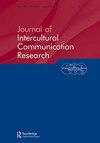Benazir Bhutto: A Wilful Muslim Woman
Q1 Social Sciences
Journal of Intercultural Communication Research
Pub Date : 2021-08-05
DOI:10.1080/17475759.2021.1963305
引用次数: 1
Abstract
ABSTRACT Media has stripped Muslim women of agency by promoting the stereotype of a “submissive” Muslim woman. My essay seeks to build a counter archive of wilful Muslim women by tracing the moves of Pakistan’s former Prime Minister, Benazir Bhutto. I argue that Benazir’s wilfulness became a catalyst for collective action that not only overthrew a tyrannical regime, but also expanded the borders of possibilities for Muslim women. Using Sara Ahmed’s theoretical construct of wilfulness, I develop three themes: how Benazir became a marked woman, how wilfulness spread amongst Pakistanis, and how Benazir’s wilfulness empowered female leadership in the Muslim world. I conclude with some autoethnographic remarks on what Benazir’s legacy means to me as a Pakistani Muslim woman.贝娜齐尔·布托:一个狡猾的穆斯林妇女
媒体通过宣传“顺从的”穆斯林妇女的刻板印象,剥夺了穆斯林妇女的能动性。我认为,贝娜齐尔的任性成为集体行动的催化剂,不仅推翻了一个专制政权,而且扩大了穆斯林妇女的可能性边界。利用萨拉·艾哈迈德关于任性的理论结构,我提出了三个主题:贝娜齐尔是如何成为一个引人注目的女人的,任性是如何在巴基斯坦人中传播的,以及贝娜齐尔的任性是如何在穆斯林世界赋予女性领导力量的。作为一名巴基斯坦穆斯林妇女,我以一些关于贝娜齐尔的遗产对我的意义的自我民族学评论作为结束语。
本文章由计算机程序翻译,如有差异,请以英文原文为准。
求助全文
约1分钟内获得全文
求助全文
来源期刊

Journal of Intercultural Communication Research
Social Sciences-Cultural Studies
CiteScore
2.00
自引率
0.00%
发文量
20
 求助内容:
求助内容: 应助结果提醒方式:
应助结果提醒方式:


